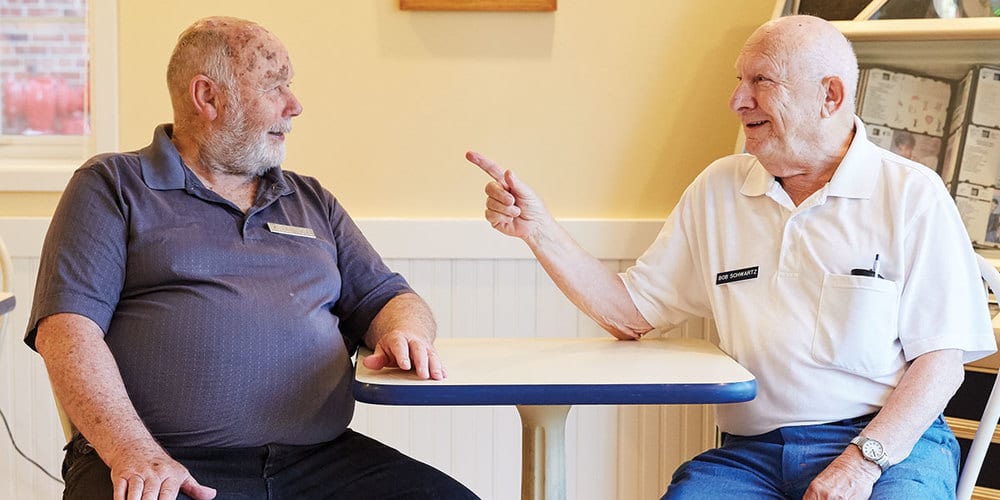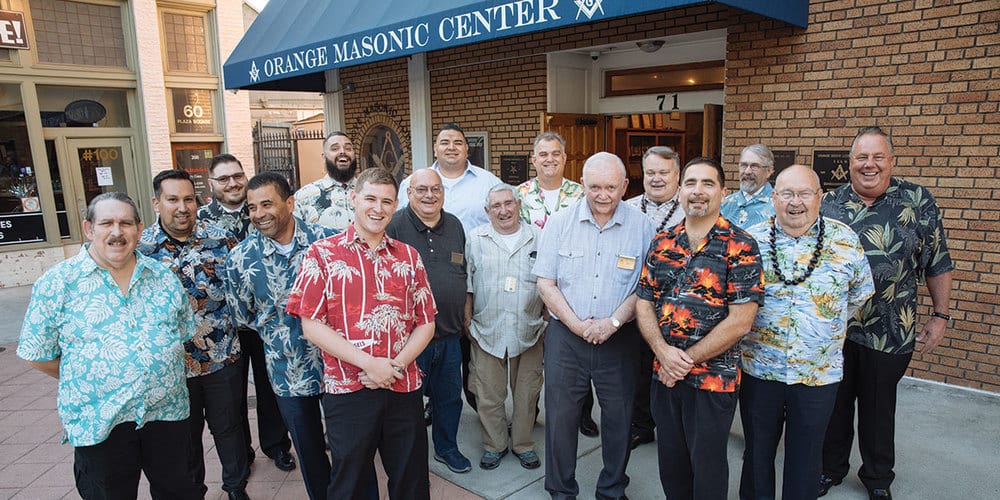
With a Little Help from My Friends
The Beatles said it in such a simple, yet significant way, “I get by with a little help from my friends.”
By Drea Muldavin-Roemer
When asked what he admires most about his friend Robert “Bob” Ruvelson, Justin Daza-Ritchie does not miss a beat. “Bob is quite possibly the most tenacious Mason that I know,” he says. “He is indefatigable.”
When asked the same question about Daza-Ritchie, Ruvelson’s response is just as effortless. “First of all, Justin is very, very intelligent,” he says. “Some people are intelligent and they don’t have a lot of what I call common sense. Justin is both very intelligent and has a huge amount of common sense.”
Justin Daza-Ritchie and Bob Ruvelson met in 2003 when Ruvelson, then a sojourner, received his 50-year pin from Liberal Arts Lodge No. 677 in Los Angeles. Now a member of Liberal Arts Lodge, Golden Veteran Ruvelson is about to turn 89. He has been a Master Mason for 66 years and a DeMolay for 72. His friend and brother, two-time past master Daza-Ritchie, has been a Master Mason for 20 years and a DeMolay for 29. Both brothers have been recognized with Hiram Awards, and each cannot sing enough praise for the other. Though they are 47 years apart, they enjoy a deep friendship based on unwavering internal compasses that inspire a profound mutual respect.
For Ruvelson, the men’s distance in age does not factor into their connection. They are bonded by common values and excellent communication, as well as an ability to work effectively together. “When we talk to each other, I’m not aware of the age difference, and I get the feeling he’s not thinking of it either,” says Ruvelson. “That’s one of the nice things about Freemasonry. Age doesn’t have to be a barrier.”
Likewise, while Daza-Ritchie clearly respects Ruvelson’s wealth of experience, he is most impressed by Ruvelson’s integrity and the actions he engenders in others. “His tenacity leads him to hold his brothers accountable to do what they have to do,” he says. “I’ve always loved that about Bob.”
Another thing that binds these two men is their coming of age as DeMolays. Though they grew up in different eras, they both developed into men with their hearts and minds rooted in a common foundation. In fact, their first joint project was participating together in the lodge’s reinstitution of the Liberal Arts DeMolay Chapter.
DeMolay taught Daza-Ritchie how to build connections with people from different generations at a young age. “There’s a transfer of wisdom you get through your intergenerational friendships,” he says. “It’s the wisdom of people who have been there.” He maintained this open-minded attitude as he aged, and upon meeting Ruvelson, he knew he’d found a kindred soul. “I think that our shared, can-do spirit – or must-do spirit – is what put us to work so closely together all these years,” he says.
Ruvelson also emphasizes what seems to be have been a natural kinship from the get-go. “We both ascribe to the same fundamental values, and that gave us a strong connection to begin with,” says Ruvelson. “We’re on the same wavelength on a lot of things, and we work very well together.”
In addition to their work at the lodge, Daza-Ritchie and Ruvelson are passionately committed to public education. Daza-Ritchie is a high school teacher in the Los Angeles Unified School District and Ruvelson has spearheaded a mentorship program titled, “The Success Program – Failure Is Not an Option,” which he has recently implemented at a continuation school in Los Angeles. His program is based on what he calls “The Four Ps”: personal responsibility, preparation, planning, and perseverance. These tenets coincide with the very qualities that Ruvelson himself possesses. It required plenty of preparation, planning, and perseverance – including a year of talking to people throughout the school district – to convince the school to try his program. As for personal responsibility, one need only ask Daza-Ritchie. “Bob’s thing is personal responsibility,” he says. “He holds himself accountable for things, and if you’re the master of the lodge, he’s going to hold you accountable, too.”
In talking to Daza-Ritchie and Ruvelson, it is easy to identify their shared proactive nature, open-mindedness, and affability. They both exemplify commitment and follow-through, qualities that are conducive to years of effective work together as Masons. “He’s a doer,” Daza-Ritchie says of Ruvelson. “We’re both doers. As a result, we seem to always end up at the same table.”
In this case, that table is Liberal Arts Lodge, where they met some 15 years ago – a place where socially imposed barriers dissipate, and where friendships form across place and time. Ruvelson reiterates, “We meet on a level playing field, where age is simply not a barrier.”

The Beatles said it in such a simple, yet significant way, “I get by with a little help from my friends.”

If you, a loved one, or a lodge brother or widow needs support, Masonic Senior Outreach Services (MSOS) may be able to help.

Each year, a brave contingent of past masters from Orange Grove Lodge No. 293 make their way through a sea of Hawaiian shirts […]